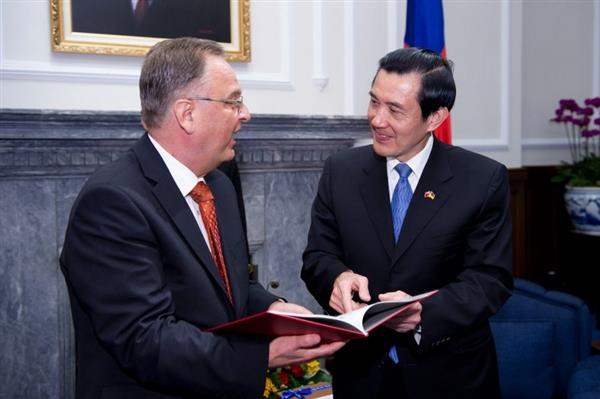News & activities
 News releases
News releases
President Ma Ying-jeou met on the morning of April 8 with former president of Germany's Federal Constitutional Court Hans-Jürgen Papier and Mrs. Papier. The president expressed his hope that Mr. Papier will bolster interaction with scholars of public law in Taiwan on his visit to further enhance the development of legal studies here.
The president remarked that Mr. Papier is an authoritative figure in Germany's public law community. He taught at the Ludwig Maximilian University of Munich for many years and in 2002 became the President of the Federal Constitutional Court of Germany, issuing many impressive legal interpretations on a number of critical questions concerning German constitutional law. Mr. Papier, the president said, is a highly respected figure in the global constitutional law community.
The president explained that the ROC formulated a constitution in 1946 and the document took effect the following year. In 1948, the Council of Grand Justices (now renamed the "Justices of the Constitutional Court") was established under the Judicial Yuan and charged with responsibility for interpreting constitutional law, he said. Germany's Federal Constitutional Court was founded in 1951 and is responsible for the protection of human rights and carrying out constitutional reviews, the president remarked, adding that over the years the court's interpretations have been closely watched throughout the global public law community, and many of Taiwan's Constitutional Court justices study these interpretations. In addition, a number of legal scholars from Taiwan have studied in Germany, he added, noting that Judicial Yuan Vice President Yeong-Chin Su earned his doctorate at the University of Munich.
President Ma recalled that after West Germany and East Germany signed the Basic Treaty in 1972, Bavaria subsequently challenged its constitutionality in litigation filed with the Constitutional Court, but the court upheld the treaty. The process and legal arguments were fascinating to follow, commented the president, adding that he long paid close attention to the issue of the two Germanys, and was later involved in the drafting of legislation on cross-strait relations and associated amendments to the ROC Constitution. As a result, he said that the development of law in Germany made a deep impression on him.
The president noted that the Judicial Yuan began translating judgments issued by Germany's Constitutional Court in 1990 and to date 12 volumes have been published. Meanwhile, 42 constitutional law scholars received funding under a National Science Council Translation and Annotation Project to translate into Chinese a collection of essays published to mark the 50th anniversary of the Federal Constitutional Court of Germany. The translation was published in October of last year, and President Ma has acquired a set to serve as reference on the development of German constitutional law.
President Ma stressed that the ROC's Justices of the Constitutional Court place utmost importance on the protection of human rights. In the past, many of their constitutional interpretations aggressively limited abuse of power by the government and enhanced the protection of the public's rights. Recently, he said, we have begun to engage in interaction with mainland China's legal community and mainland scholars of public law have expressed high regard for Taiwan's constitutional review system.
The president also told Mr. Papier that when studying at Harvard University in 1976 he found a copy of the German Civil Code that had been translated into English early in the 20th century by a scholar from our country. He said that the book had made the rounds in the United States and it was not until nearly 70 years later that a second English translation of Germany's Civil Code was published. The scholar who did the earlier translation was Chung Hui Wang, a judge at the Permanent Court of International Justice and the ROC's former Judicial Yuan President.
President Ma expressed the importance he places on the protection of human rights, commenting that after he took office in May 2008 he specially signed the instruments of ratification for the International Covenant on Civil and Political Rights and the International Covenant on Economic, Social and Cultural Rights that the ROC signed in 1967. In addition, the president required that the content of these two covenants be incorporated into domestic law to make them legally binding. This, he said, is further raising the level of protection of human rights for the people of Taiwan and is bringing Taiwan in step with internationally accepted practices.
Mr. and Mrs. Papier were accompanied to the Presidential Office by Judicial Yuan Vice President Su to meet President Ma. Also attending the meeting was National Security Council Deputy Secretary-General Chih-kung Liu.



